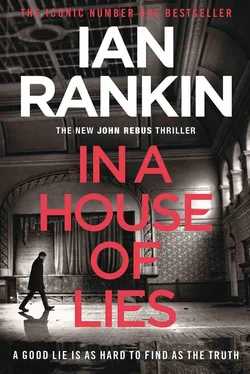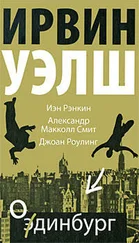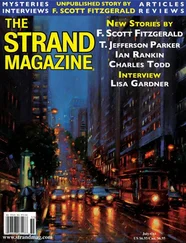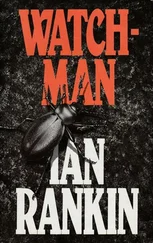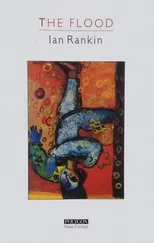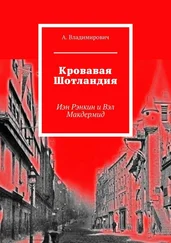Rebus rose to his feet. ‘Thing is, this is me relaxed and enjoying myself. You, on the other hand...’
‘What?’
Rebus gestured towards Cafferty’s forehead. ‘Vein in your temple there started beating out a tattoo five minutes ago — and that means my work here is done.’
Cafferty stayed seated as Rebus headed for the door. Only after it had closed did he press a finger to his temple. Rebus was right, he could feel the pulse there, and he wasn’t entirely sure any length of gym workout would cure it.
Rebus hadn’t been to Poretoun Woods since the early days of the misper inquiry. It seemed to him a bit less managed, its natural wildness taking hold. The track into the woods was easily identified thanks to the many visits by police and other professionals. Deep ruts showed where a tractor had towed the VW to a waiting trailer. One marked police car indicated that some poor sod was still on guard duty — to what end, Rebus couldn’t say. The crunch of twigs and leaves underfoot signalled his arrival, giving the uniform time to lever himself up from the tree he’d been resting against.
‘At ease, son,’ Rebus said. ‘I’m just having a look, that’s all.’
‘Off limits to the public,’ the constable stated.
‘I’m attached to the inquiry.’
‘Then how come I wasn’t told you were coming?’
‘They’ve got too much on their plate at Leith as it is,’ Rebus improvised. ‘Sorry to have to tell you, but you’re not their highest priority.’
His tone seemed to reassure the constable. Rebus reckoned the lad would have been in primary school twelve years back. The acne on both cheeks had probably bothered him since soon after.
‘No point me asking if you’ve seen anything unusual?’
‘A few gawpers from the village,’ the officer confided. ‘Couple of reporters. All they want is a photo of where it happened, even if it didn’t happen here.’
Rebus studied him. ‘You’ve heard, then?’
The uniform nodded. ‘Car might have been transported here with the deceased in it.’
Rebus was peering over the crime-scene tape down into the gully.
‘There’s a rope if you want a closer look.’
‘Son, do I look in any shape to do that?’ Rebus raised a finger. ‘And by the way, don’t feel you need to answer.’
‘Nothing down there anyway,’ the constable conceded.
Rebus was looking around him. All he saw were trees. No way of knowing if he’d walked past here during the search. He’d been CID anyway, a sightseer while the uniforms covered the ground, armed with sticks and keen eyes. He recalled that a flooded quarry a few miles away had also been visited by divers with air tanks and powerful torches. Then there’d been the disused mines just south of Bonnyrigg. Photos of the missing man had been placed in shop windows, tied to lamp posts, pushed through letter boxes, while back in the CID office Bloom’s phone records were being checked, his emails scoured for clues. Dozens upon dozens of interviews, because the longer he stayed missing, the more apparent it became that his vanishing act was not voluntary, and probably no accident. So they’d hauled in both Jackie Ness and Adrian Brand for a proper grilling, then the boyfriend. Hours of questions, all of it leading them in circles. Bill Rawlston had been old school, zeroed straight in on what he called Bloom’s ‘lifestyle’, code for his sexuality. According to Derek Shankley, theirs had been a monogamous relationship, ‘apart from the odd snog, obviously’. Snogs at private parties held in friends’ homes; snogs on the dance floor at Rogues.
‘The partner doesn’t always know, though,’ was all Rawlston said about that.
Brand and Ness had arrived for their meets with CID phalanxed by lawyers; Derek Shankley had taken his dad. Or, more likely, the dad had insisted on tagging along. Of course Rebus had known Alex Shankley. Shankley was an expert on Glasgow gangs and gangsters; Rebus knew more about their Edinburgh equivalents than anyone in the city. Information had been traded down the years. A tip-off about a summit; a request for surveillance; titbits learned from phone taps. Old-school cooperation, at the end of which a bottle of whisky would be sent as thanks and gratefully received.
‘I worked the original case,’ Rebus told the constable, in explanation for his long silence.
‘I heard there were some issues.’
‘If by issues you mean fuck-ups...’ Rebus, hands stuffed into his coat pockets, gave a shrug. ‘Let’s be generous and say we just took a few wrong turns. How much longer are you going to be out here?’
‘This is supposed to be the last day. Tape comes down in the morning.’
The months would pass, Rebus knew, and people would start to forget. Or else they’d walk the woods not having known in the first place. He wondered at the efficacy of dusting off people’s memories, all those individuals interviewed first time round. Details would have evaporated, moments blurred. The human mind wasn’t exactly a reliable witness at the best of times. Taking a final look into the gully, he spotted a green wreath against one of the steep sides, not quite at the bottom.
‘The parents,’ the constable explained. ‘Yesterday morning, before my shift started.’
Rebus nodded slowly and started the long walk back to his car.
He didn’t drive far, coming off the track on to a muddy tarmacked B road. A couple of left turns and he was at the gates to Poretoun House. The gates were closed, no sign of a bell or anything. A padlocked chain. When Rebus pushed, there was just enough give for him to squeeze through the gap — security obviously not much of an issue.
‘That’s what losing a few pounds does for you, John,’ he said to himself. Twenty pounds actually. First time he’d gone to the Oxford Bar after shedding it, they’d asked if he had long to live. He’d been forced to tell them it wasn’t cancer. No, not cancer, but he was buggered if he was going to let COPD have him without a fight. One of the other patients at the respiratory clinic had used a phrase — ‘managed decline’ — and it had stuck with Rebus. To him, it seemed to sum up his whole life since retirement, and maybe even before.
‘Cheery bastard today,’ he muttered as he walked.
The driveway was overgrown, the gravel surface green with weeds and moss. The house itself soon appeared, looking forlorn. He remembered visiting it to question Jackie Ness, in a huge and overly ornate living room. Mary Skelton had been with him; it was one of those rare days when she seemed able to focus on her job rather than her sleeping arrangements. Not that they’d lingered at Poretoun House. It had been a follow-up; they were there to take receipt of printed communications between Ness and the misper. Rebus remembered the film memorabilia, the posters and props. The hallway had become a repository for lighting rigs, rails filled with costumes, camera tripods. Had anyone thought to mention that Stuart Bloom had appeared in one of Ness’s films? Had Ness himself or maybe Derek Shankley said something? If so, whoever they’d told hadn’t thought it worth recording. The family really had earned their eventual begrudged and belated apology.
‘Utter shambles,’ Rebus said to himself.
He did a circuit of the building’s exterior. Lawns that had stopped being tended to. A broken window pane, boarded up. Foliage sprouting from gutters and downpipes. No sign of life. He crouched by the front door, peering through the letter box. The hall was dusty and empty. No sign of any mail on the floor. Most of the windows had been shuttered, upstairs and down. But he found one where the shutters didn’t quite meet and pressed his nose to the glass. The living room was devoid of furniture, cracks appearing in its stuccoed ceiling. Didn’t seem to him that anyone was even bothering to heat the place. Turning away from the house, he had a clear view towards the woods. The last time anyone had seen Stuart Bloom alive, he’d been driving away in his Polo.
Читать дальше
